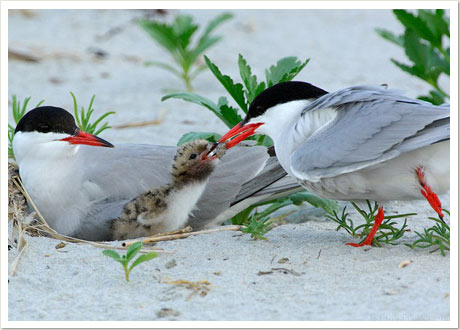|
| Common Tern |
PHOTO: 1 2 3 |
 |
|
 |
 |
| Common Terns are a characteristic species of the New England coast. They arrive in late April, and by mid-May thousands nest in the beach's dunes. Common Terns rely on group defense to protect their nests, and their scolding calls fill the air in mid-summer. Plymouth Beach is a critical nesting and resting habitat for a large portion of Massachusetts's breeding tern population, and one of only a few places in the northeast where so many terns can be seen in one place. |
|
|